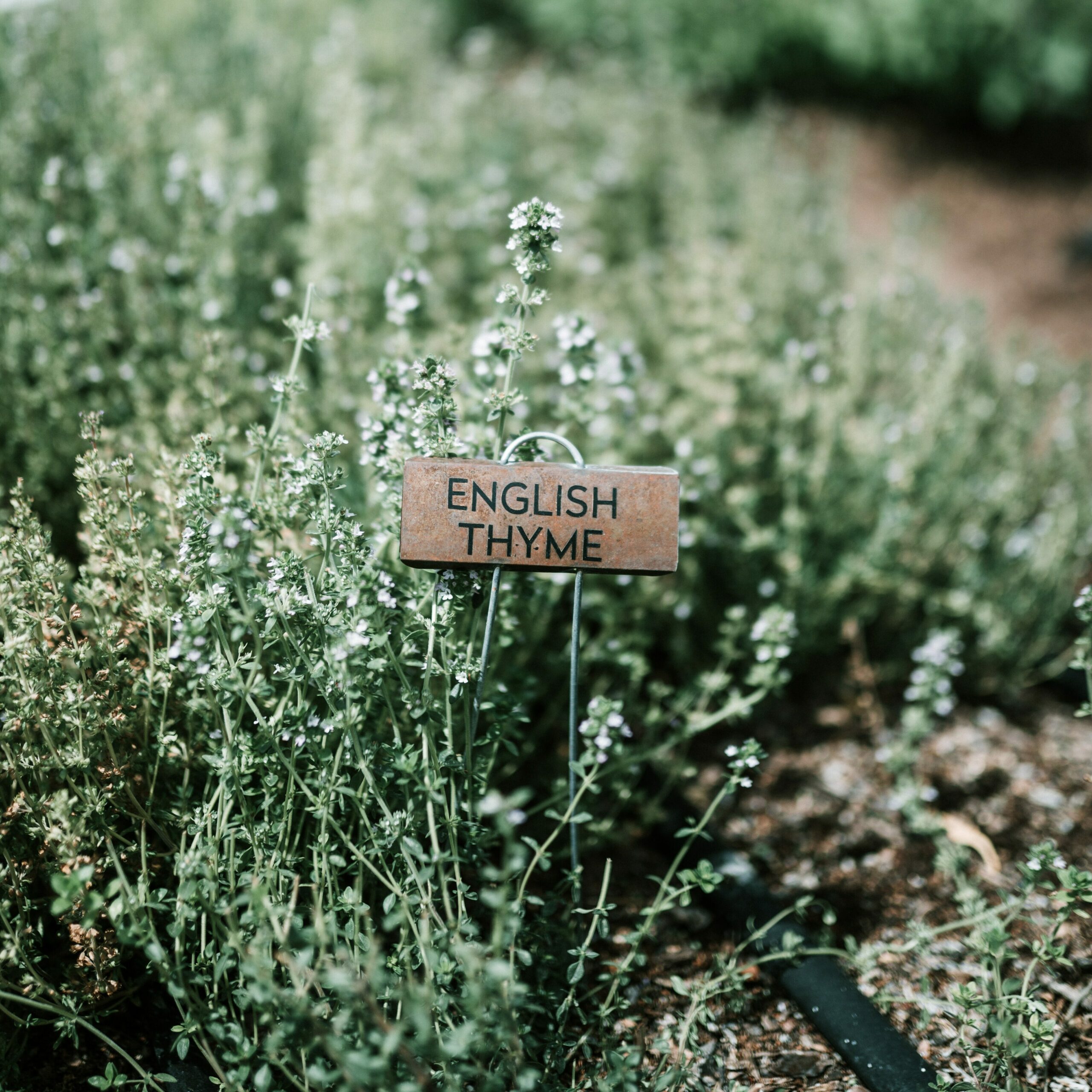
Thyme, Garden Thyme
Thymus vulgaris (Lamiaceae)
Most people are already familiar with Thyme in their kitchen as so many recipes call for it! It is native to the Mediterranean region and grows as a perennial subshrub. Its robust flavor pairs well as a seasoning for soups, pasta, fish, and more. Thyme doesn’t stop there, it also has many medicinal properties and is used in a multitude of home remedy recipes. With its aromatic fragrance and delicate leaves, thyme has been cherished for centuries as a companion for your herbal garden, dinner, and your medicine cabinet!
Thyme is particularly rich in vitamin A and vitamin C. Vitamin A is an antioxidant known for being vital in maintaining healthy mucus membranes and skin as well as good vision. Vitamin C is essential to resist infectious diseases and protects against harmful pro-inflammatory free radicals. (1) Thyme is a very powerful remedy for infections of all kinds, especially in the lungs and digestive tract. It is indicated for spasmodic conditions of the respiratory and urinary tracts with infectious symptoms. It is a good antifungal and can be used to treat gut dysbiosis. (Easley and Horne p. 311)
Parts Used: Fresh and dried aerial parts, fresh and dried leaves
Key Constituents: Flavonoids, Phenolic Acid, Volatile Oil (thymol, carvacrol, geraniol, borneol)
Energetics: Warming and Drying
Thyme Uses and Research
Aching Muscles and Muscle Cramps
Many compounds found within thyme have been shown to relieve muscle cramps. This makes it a great companion for a warm bath! Make an infusion with about 25g of thyme to 3 cups of water. Let it steep for 10/15 minutes and strain into your bathwater and soak for 20 to 30 minutes. You can also add other herbs as well like rosemary or even rose petals! Studies have also found that drinking thyme tea can help reduce the severity of menstrual cramps (2).
Bites and Stings
Since thyme has great antiseptic properties you rub freshly squeezed leaves directly on the sting or bite. You can alternatively mix thyme essential oil with a carrier oil to prevent irritation and apply it to bites and stings if you don’t have the fresh plant available.
Coughs and Bronchitis
Thyme is great to use on its own or mixed as a supporting herb in other recipes for coughs and bronchitis. Make an infusion with 1 tsp of dried thyme or 2 tsp of fresh thyme in a cup of warm water. Take up to 3 times a day. As an added help mix 5 drops of thyme essential oil and 5 drops of eucalyptus oil with a carrier oil like olive or coconut and rub on your chest and back 1 to 2 times a day.
Fungal Infections
Thyme’s volatile oils contain mostly thymol and carvacrol and have strong antiseptic properties. The oil should be diluted before use to avoid irritation. You can dilute with a carrier oil like olive oil, coconut oil, jojoba oil, etc. and apply it to the skin.
Earaches
Use as a tincture with other herbs like echinacea, lavender, marshmallow, or elderflower to aid with earaches due to a cold or congestion.
Mild Asthma
Thyme is prescribed with other herbs for asthma, especially in children. Its invigorating qualities balance the sedative effect of many herbs used for asthma (Chavallier, p.143)
Acne
Due to its antiseptic properties thyme essential oil can be used as a spot treatment for inflamed acne. Make sure to dilute to 5% and dab on any inflamed spots.
Sore Throat
No one likes to have a sore throat! It can be a pesky problem to deal with and get through your day. Whether you are coming down with a cold or are dealing with dry winter air many herbs can support your symptoms. To help aid a sore throat drink thyme tea alone or with other supporting herbs. You can also use the tea to gargle up to 3 times daily.
Maintaining Vitality
Recent research has discovered that thyme has antiaging and tonic properties that maintain vitality and reduce the chance of catching colds, flu, and other respiratory infections. (Chavallier, p.319). To use as a general remedy for wellness and vitality drink a standard infusion of thyme and warm water daily or on a day you need a warm beverage to assist you with your day!
Hair Growth and Hair Loss
If you have been dealing with hair loss or growing out your gorgeous locks, thyme can help! Many people have heard of using rosemary which has great hair benefits but thyme also can help with scalp health. Use alone or with other hair growth-supporting herbs to aid in your hair growth journey. Use an infusion of thyme as a hair rinse, make sure to rub it into scalp. You can alternatively use thyme essential oil, rub it into the scalp, and leave for at least 10 minutes before washing.
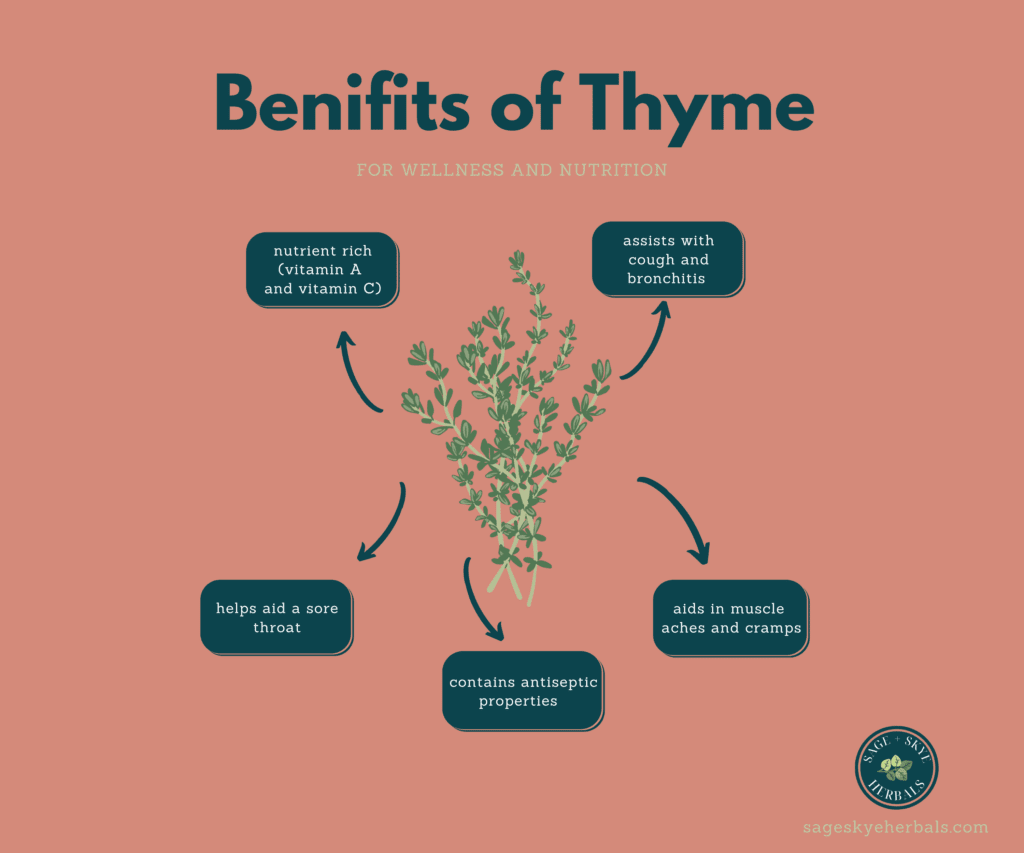
Magick Properties/Folklore
Used as an incense to restore clarity of the mind and strength and to clear a space from sickness. It was once gifted to soldiers on their way into battle in the Middle Ages. It was thought to evoke a spirit of courage in those who inhaled it. The name Thyme, in its Greek form, was first given to the plant by the Greeks as a derivative of a word which meant ‘to fumigate,’ either because they used it as incense, for its balsamic odour, or because it was taken as a type of all sweet-smelling herbs. Others derive the name from the Greek words thyo, meaning perfume or Thymus, signifying courage, the plant being held in ancient and medieval days to be a great source of invigoration, its pleasant qualities inspiring courage. (5)
Preparations
Infusion– 1 tsp dried or 2 tsp fresh to a cup of warm water. Take 1/2 cup up to 3 times daily or massage into the scalp to promote hair growth.
Syrup– traditional to use as a cough remedy and can be taken 1 tbsp up to 3 times daily
Tincture– Take up to 1 tsp of thyme tincture by mouth or dilute in a cup of water up to 3 times daily.
Essential Oil -Dilute and use topically for acne spots, bites and stings, muscle pains, and fungal infections. Rub into the scalp to promote hair growth.
Incense– Light an herb bundle made with Thyme and blow out the flame. Use the smoke to cleanse the area or room/s. Make sure to open a window or door to allow the smoke and energy to leave the space. Have a heatproof container or ashtray to put out the flame completely when finished.
Safety and Precautions
Do not take essential oils internally. Essential oils are to be used topically only and should be diluted with a carrier oil before use. Essential oils and highly concentrated forms of the herb are not recommended for pregnant women. Overconsumption of thyme can sometimes cause an upset stomach. Always speak with your healthcare provider before using and check any interactions with prescription medication. Work with a registered clinical herbalist for a holistic plan of care.
Disclaimer: These statements have not been evaluated by the Food and Drug Administration. This product is not intended to diagnose, treat, cure or prevent any disease.
Sources
2.https://www.ncbi.nlm.nih.gov/pmc/articles/PMC7585774/
3. Chevallier, Andrew. Encyclopedia of Herbal Medicine. 2016
4.Easley, Thomas and Horne, Steven. The Modern Herbal Dispensatory. 2016

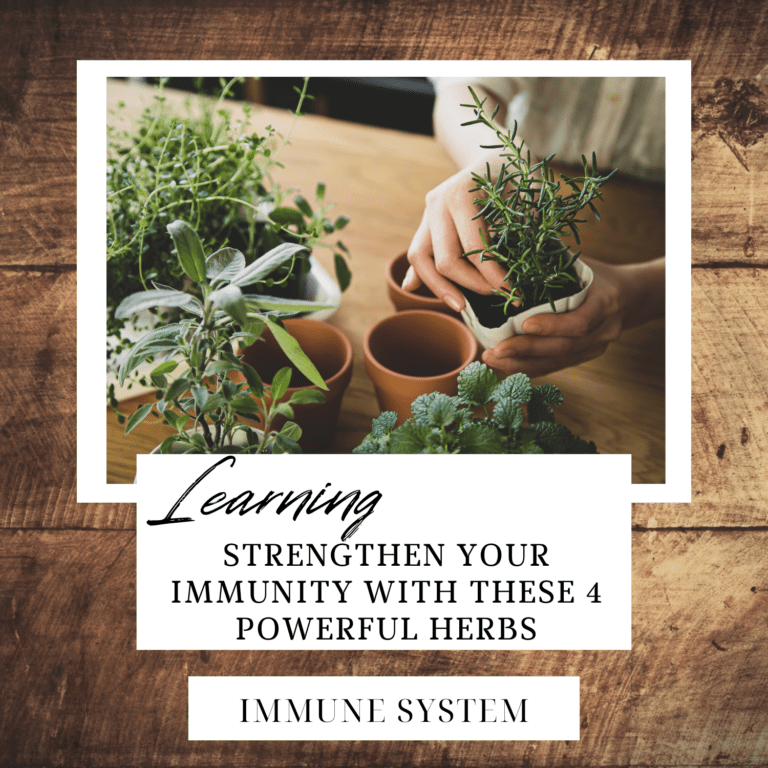
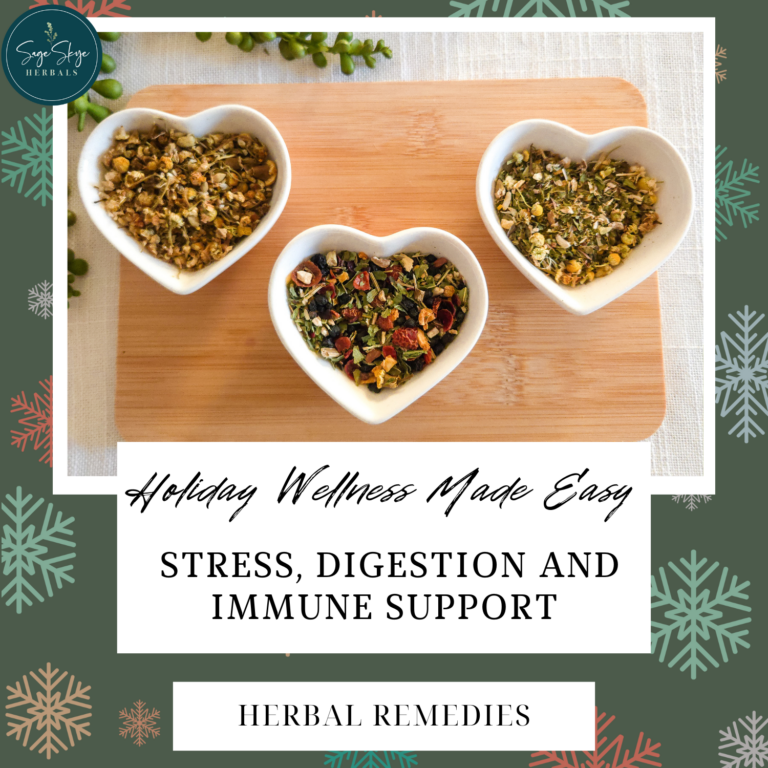
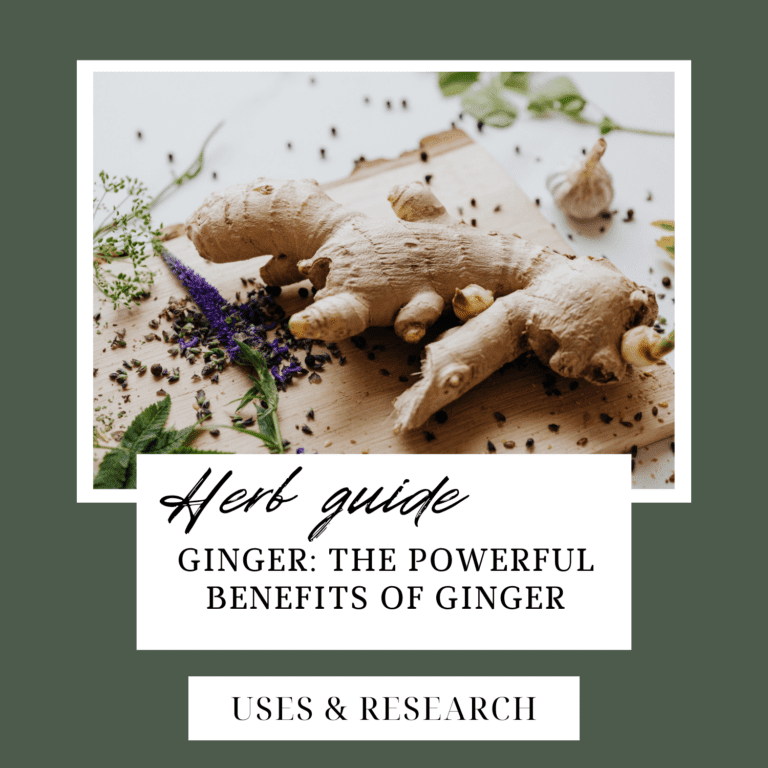
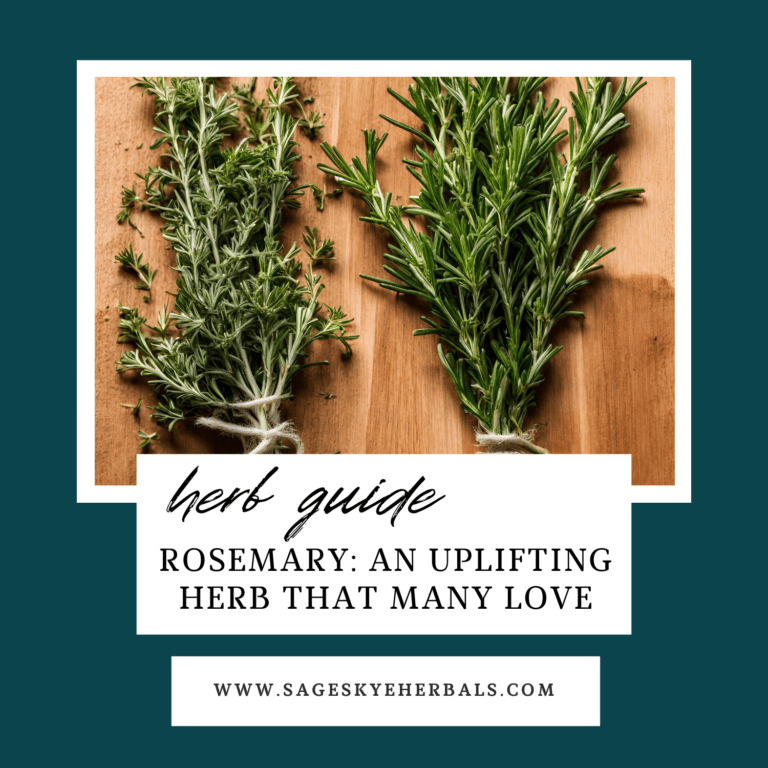
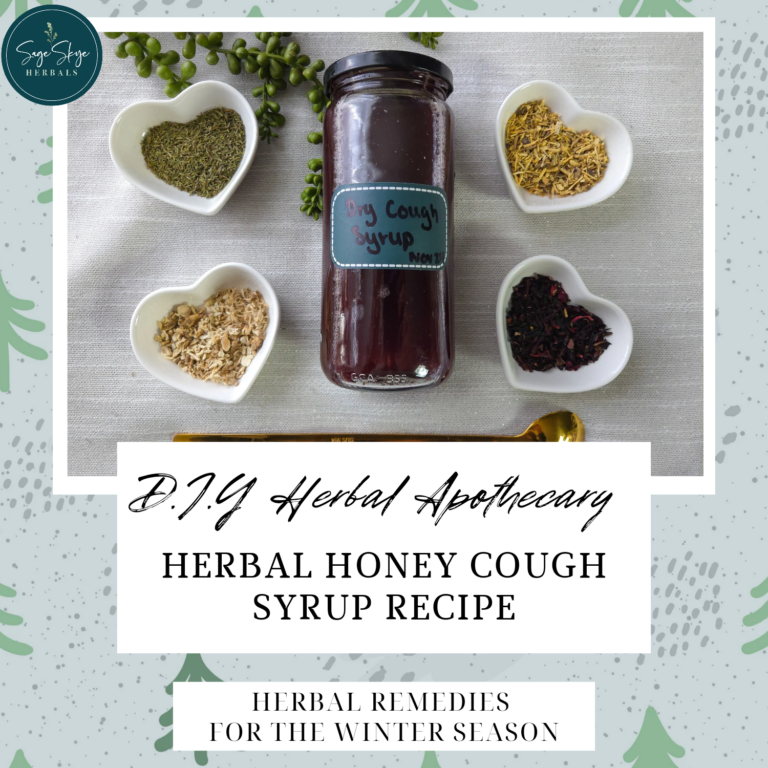

2 Comments